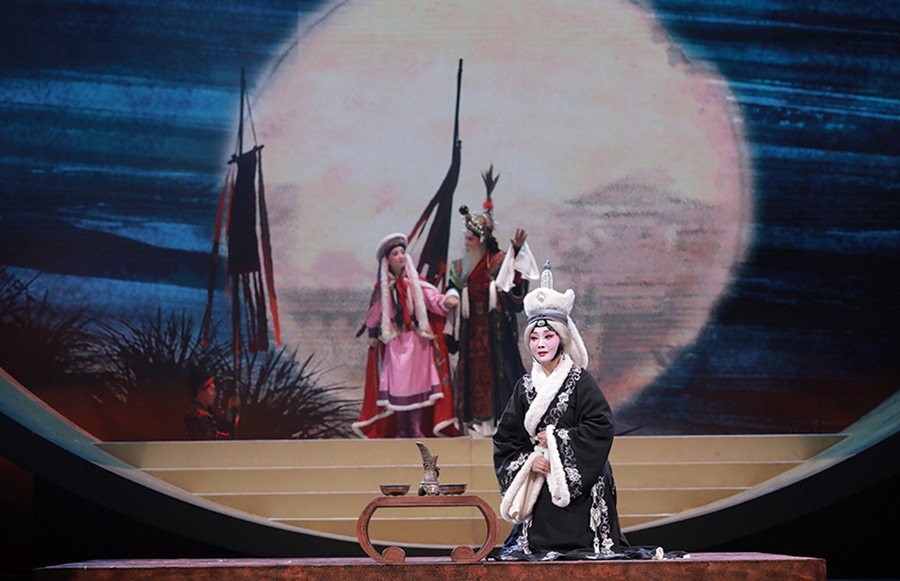THE JOURNEY OF ZHAJOUN

Xi'an Yisu Theatre, Shanxi, China
Director: Yang Jun
Chinese with Hungarian and English subtitles
1 hours, without breaks.
More than two thousand years ago, the Great Han Empire defeated the Hun rebels in the Western Regions, and the Hun Chieftain Huhanye asked for a peace treaty through an intermarriage with a Han Princess. Han Emperor Yuan wished for a long-term stability between Han and Hun. It happened that he saw an attractive maid Zhaojun, a versatile court musician, whom he took as an ideal person to be disguised as a princess and married to the far Northern prairie. A plague ravaged the Hun region, Chieftain Huhanye passed away when Zhaojun was giving birth to her son. Zhaojun wrote a petition to Han Emperor Cheng, asking a permission of return. Han Emperor Cheng, however, replied her that she must follow the customs of the Hun and remarry to another chieftain Fuzhulei. Zhaojun overwhelmed with sorrow and perplexed by a dilemma. Peaceful days ended years later, when the Hun royal court was in a chaotic disorder and several murders took place, resulting in the deaths of both the son and the daughter of Emperor Zhaojun. The Han and the Hun was on the verge of war again. What should Zhaojun, the "shepherd" who married to the desert, do under such a tough situation? The play deals with a perpetual topic of peace and stability. It gives an insight on how people should strive for peace and harmonious co-existence among different peoples, both in the old days, and in the world communities today. The performance is a Qinqiang opera, the oldest form of opera in China, from Shanxi Province, starred by Hui Minli, the winner of the highest award in Chinese theatre performance—the "Plum-Blossom Award", and the president of Xi'an Yisu Theatre.
Actors:
Xi'an Yisu Theatre Actors Led by Hui Minli
Director: Yang Jun
Stage designer: Chang Jiang, Pang Peng
Costume designer: Jiang Dian, Shang Qunhan
Choreographer: Wang Zhao
Composer: Dang Hongyan
Dramaturge: Liu Enping
Singing Style Design: Jiang Erli
Orchestration: Dang Hongyan, Cheng Qiang
Conductor: Zhou Dawei
Light Designer: Meng Qin, Shi Lang, Li Wendong
Styling Design: Yao Yue, Hao Tingting
Video Design: Hu Tianji
Assistant Director: Zhao Lulu
Fighting designer: Ran Xing, Yang Yun
Awards and prizes of the performance (in English):
- The 18th China Theatre Festival Award for Excellent Productions
- 2023 Ministry of Culture and Tourism's Major Historical Theme Creation Project
- The 10th Shaanxi Province Art Festival Wenhua Grand Award
- Excellent Showcase on the 9th Silk Road International Art Festival
This play is starred by Hui Minli, the winner of the highest award in Chinese theatre performance—the Plum-Blossom Award, and the president of Xi'an Yisu Theatre.
"I am a daughter of Han Nationality, married to the chieftain of the Hun ethnic people. Thousand of miles away from my home, my traveling road seems never to end ..." It is a long journey of a Han woman and her travelling soul, it is a story of the harmony and brotherhood between Han nationality and the Hun ethnic group.
After a conversation through the window, the two had reached an agreement. At the farewell ceremony, Zhaojun glorified the Han Palace with her beauty and grace. Her only request before departure greatly shocked both parties of the Han and the Hun. On the way out of the border pass, Huhanye cried at their old land of Mount Yinshan which no longer belonged to the Hun people. Zhaojun adopted an orphan at a ruin. The Han and the Hun smear the blood as a sign of the oath (the old Chinese practice of making an alliance).
Peaceful days ended years later, when the Hun royal court was in a chaotic disorder and several murders took place, resulting in the deaths of both the son and the daughter of Emperor Zhaojun. The Han and the Hun was on the verge of war again. What should Zhaojun, the "shepherd" who married to the desert, do under such a tough situation?
The play deals with a perpetual topic of peace and stability. It gives an insight on how people should strive for peace and harmonious co-existence among different peoples, both in the old days, and in the world communities today.












